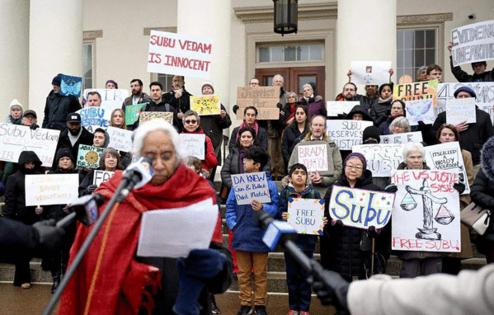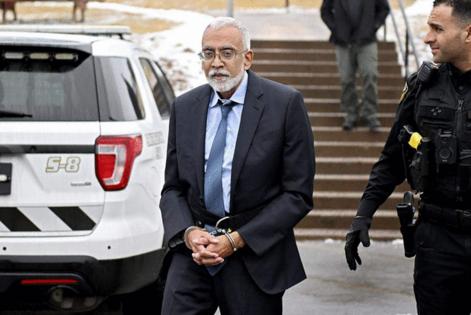He was wrongfully imprisoned for 43 years. Moments after being released, ICE took him
Published in News & Features
On the morning of Oct. 3, 2025, Subramanyam “Subu” Vedam walked out of Huntingdon State Correctional Institution, the Pennsylvania prison that had confined him for more than four decades. The 64-year-old had spent nearly his entire adult life behind bars for a murder he did not commit. His conviction had been vacated weeks earlier after a court found that prosecutors had concealed evidence that would have dismantled the state’s case. The Centre County district attorney formally withdrew all charges a day before his expected release.
But Subu never made it home.
As he stood on the threshold of freedom, officers from U.S. Immigration and Customs Enforcement were waiting. Acting on a decades-old deportation order, they detained him and transferred him to the Moshannon Valley Processing Center, an ICE detention facility in central Pennsylvania.
His family, who had prepared to welcome him home, instead learned that Subu would remain in custody — not as a prisoner of the state, but as a detainee of the federal government.
“To our disappointment, Subu was transferred to ICE custody and is currently being held at the Moshannon Valley Processing Center,” the family said in a statement posted on a website dedicated to building support for Vedam’s case.
“This immigration issue is a remnant of Subu’s original case. Since that wrongful conviction has now been officially vacated and all charges against Subu have been dismissed, we have asked the immigration court to reopen the case and consider the fact that Subu has been exonerated. Our family continues to wait — and long for the day we can finally be together with him again.”
Subu’s legal odyssey began in 1982, when he was arrested for the 1980 murder of his friend, 19-year-old Thomas Kinser, in Centre County. Prosecutors argued that Subu had shot Kinser with a .25-caliber pistol — a weapon that was never recovered — and based their case largely on circumstantial evidence. He was initially arrested in 1982 and convicted the following year, being finally sentenced to life without parole.
For the next 42 years, Subu maintained his innocence. His appeals were repeatedly denied, and his case languished until the Pennsylvania Innocence Project joined his defense team. In 2022, the project’s attorneys discovered previously undisclosed evidence in the files of the Centre County District Attorney’s Office — including an FBI report and handwritten notes suggesting that the bullet wound in Kinser’s skull was too small to have been caused by a .25-caliber bullet. That revelation undermined the entire prosecution theory.
In August 2025, Judge Jonathan Grine of the Centre County Court of Common Pleas ruled that the concealed evidence represented a constitutional violation of due process. “Had that evidence been available at the time,” Grine wrote, “there would have been a reasonable probability that the jury’s judgment would have been affected.” One month later, District Attorney Bernie Cantorna dismissed the murder charge, saying a retrial would be both impossible and unjust.
By then, Subu had become the longest-serving exoneree in Pennsylvania history — and one of the longest-serving in the United States.
Freedom, however, came with a new peril.
ICE cited a “legacy deportation order” dating back to the 1980s, tied not only to the murder charge but also to an earlier drug conviction from Subu’s youth. Before his arrest for murder, he had pleaded guilty at age 19 to intent to distribute LSD — a charge his family describes as a youthful mistake. Although that conviction carried its own immigration consequences, Subu, who was born in India but arrived in the United States when he was 9 months old, was never deported because he was serving a life sentence.
Now, after his exoneration, ICE has revived the decades-old order.
In a statement sent to the Herald, ICE said Philadelphia officers Vedam into custody immediately after his release because his criminal past.
“Pursuant to the Immigration and Nationality Act, individuals who have exhausted all avenues of immigration relief and possess standing removal orders are priorities for enforcement. ERO notes that Mr. Vedam, a career criminal with a rap sheet dating back to 1980, is also a convicted controlled substance trafficker,” ICE said in an email. “Mr. Vedam will be held in ICE custody while the agency arranges for his removal in accordance with all applicable laws and due-process requirements”.
Mike Truppa, a spokesperson for the family, says the move blindsided Vedam’s family. “They’re emotionally reeling from the fact that he could be sent to a country he doesn’t know,” he said. “There’s some ancestry in India where he might have some nominal relations, but his entire family — all of his family relationships — are here and in Canada.”
Subu’s niece, Zoë Miller Vedam, said the family has little sense of what to expect from the immigration proceedings but continues to hold on to hope. “I’m not sure we have expectations. We definitely have hope,” she said. “It’s been a very long journey toward exonerating my uncle. He spent the last 44 years incarcerated for a crime he did not commit, and we’ve been fighting and supporting him this whole time.”
Zoë described her uncle as a deeply compassionate man who transformed his decades of imprisonment into a mission of service. “He really did so much over those years to show the person that he is,” she said. “He worked as a teacher, helping many, many people get their degrees — people who’ve spoken to us afterwards about how having him support them while they were incarcerated really changed their lives. He completed multiple degrees himself. He was always learning and caring.”
She added that Subu’s potential deportation to India would be devastating. “India, in many ways, is a completely different world to him,” she said. “He left India when he was nine months old. None of us can remember our lives at nine months old. He hasn’t been there for over 44 years, and the people he knew when he went as a child have passed away. His whole family — his sister, his nieces, his grand-nieces — we’re all U.S. citizens, and we all live here.”
Zoë said her uncle’s wrongful conviction had robbed him of the chance to build a normal life and left him unprepared for exile in a country he doesn’t know. “He’s never been able to work outside the prison system,” she said. “He’s never seen a modern film, he’s never been on the internet, he doesn’t know technology. To send him to India at 64, on his own and away from his family and community, would be just extending the harm of his wrongful incarceration.”
Subu’s legal team has filed a motion to reopen the immigration case and a petition for a stay of deportation while the motion is pending. The government has until Oct. 24 to respond.
Over the decades, Subu built a life of quiet purpose inside prison walls. By all accounts, he was a model inmate. He designed and led literacy programs, raised funds for Big Brothers Big Sisters, and tutored hundreds of fellow prisoners working toward high school diplomas. He became the first person in the 150-year history of the facility to earn a master’s degree, completing his coursework by correspondence with a 4.0 GPA.
“Subu’s true character is evidenced in the way he spent his 43 years of imprisonment for a crime he didn’t commit,” said his sister, Saraswathi Vedam, in a statement. “Rather than succumb to this dreadful hardship and mourn his terrible fate, he turned his wrongful imprisonment into a vehicle of service to others.”
At the heart of the current dispute lies a question of legal timing — and humanity. Because Subu was never formally naturalized, his earlier drug conviction technically makes him deportable under U.S. immigration law. The wrongful murder conviction, now vacated, had kept him in state custody for decades, effectively freezing that process. With his exoneration, ICE argues that the original deportation order can now be executed.
To Subu’s defenders, that logic defies both fairness and decency. The government is portraying him as a “career criminal and drug trafficker.” The defense intends to argue that the totality of circumstances — Subu’s wrongful imprisonment, his lifelong residence in the United States, and his record of rehabilitation — warrants reopening the case.
For his niece, the fight is about more than legal arguments. “After 43 years of having his life taken from him because of a wrongful conviction, to send him to the other side of the world — to a place he doesn’t know, away from everyone who loves him — would just compound that injustice,” Zoë said. “We’re going to keep supporting him and doing everything we can to make sure that, now that he’s finally been exonerated, he’ll be able to be home with his family.”
©2025 Miami Herald. Visit miamiherald.com. Distributed by Tribune Content Agency, LLC.










Comments